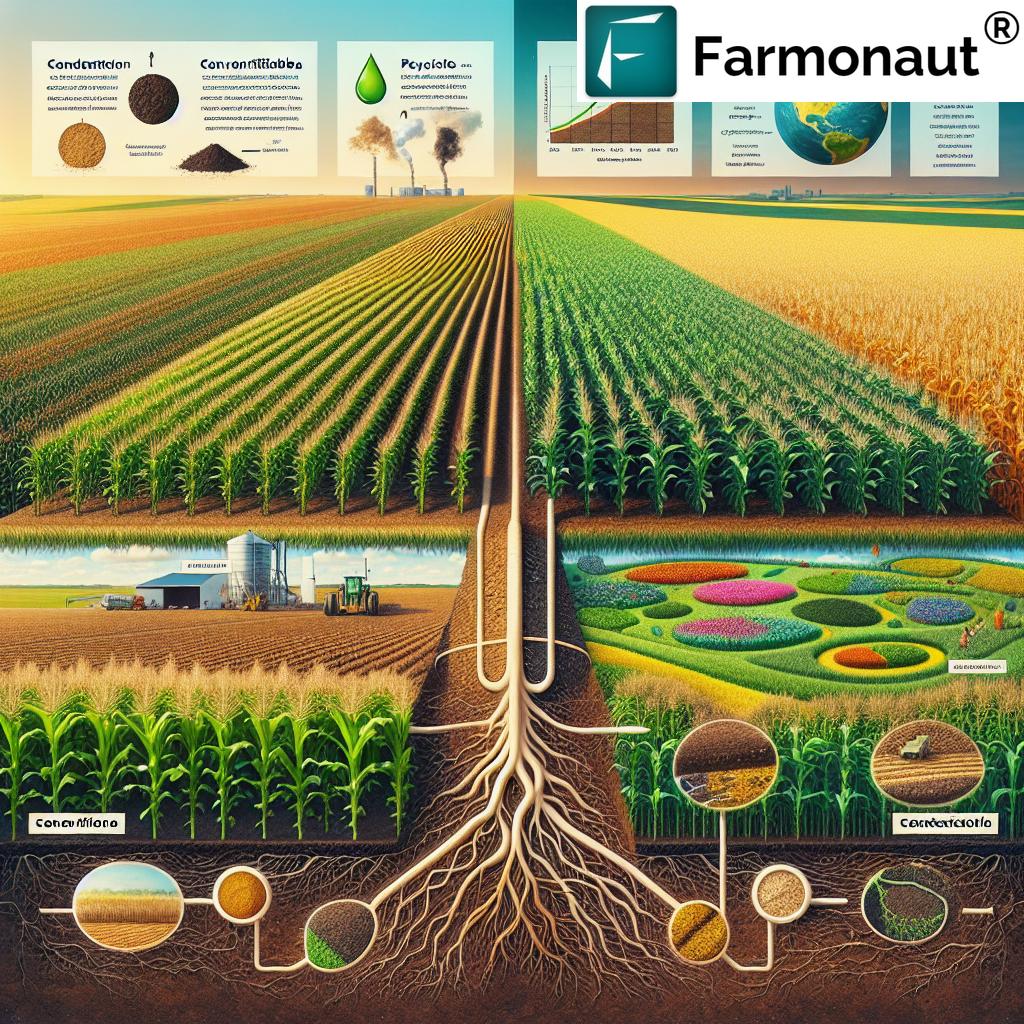Revolutionizing Nebraska’s Soil Health: Sustainable Farming Practices for Resilient Agroecosystems
“Nebraska farmers implementing sustainable practices have increased soil organic matter by up to 2% in just 5 years.”
Welcome to our comprehensive exploration of sustainable agriculture practices and soil health management in Nebraska. As we delve into the world of agricultural biogeochemistry and innovative soil nutrient management strategies, we’ll uncover how these practices are revolutionizing farming in the digital age. At Farmonaut, we’re committed to providing farmers with cutting-edge tools to enhance their agricultural practices while promoting environmental stewardship.

The Importance of Soil Health in Nebraska’s Agriculture
Nebraska’s rich agricultural heritage is deeply rooted in its soil. As we face the challenges of climate change and the need for increased food production, maintaining and improving soil health has become more critical than ever. Sustainable agriculture practices play a pivotal role in creating resilient farming systems that can withstand environmental stresses while ensuring long-term productivity.
In this blog post, we’ll explore how agroecology principles and carbon sequestration techniques in agriculture are transforming Nebraska’s farming landscape. We’ll also discuss the benefits of perennial crops, the role of soil ecosystem services, and the latest advancements in sustainable intensification techniques.
Sustainable Agriculture Practices for Nebraska Farms
Let’s dive into some of the most effective sustainable farming practices that are making a significant impact on soil health in Nebraska:
- Cover Cropping: This practice involves planting crops specifically to cover the soil rather than for harvest. Cover crops help prevent soil erosion, improve soil structure, and increase organic matter content.
- No-Till Farming: By minimizing soil disturbance, no-till farming helps preserve soil structure, reduce erosion, and increase water retention.
- Crop Rotation: Alternating crops in a specific field helps break pest cycles, improves soil fertility, and enhances overall soil health.
- Integrated Nutrient Management: This approach optimizes the use of organic and inorganic fertilizers to maintain soil fertility while minimizing environmental impact.
These practices not only improve soil health but also contribute to carbon sequestration, helping mitigate climate change impacts. At Farmonaut, we provide satellite-based crop health monitoring tools that can help farmers implement and track the success of these sustainable practices.
The Role of Agroecology in Nebraska’s Farming Future
Agroecology principles are at the heart of sustainable farming in Nebraska. This holistic approach considers the ecological, economic, and social aspects of agriculture. By working with nature rather than against it, agroecological practices help create more resilient and productive farming systems.
Some key agroecology principles being applied in Nebraska include:
- Enhancing biodiversity on farms
- Promoting soil health through organic matter management
- Minimizing the use of synthetic inputs
- Integrating livestock and crop production
These principles not only improve soil health but also contribute to the overall sustainability of Nebraska’s agricultural landscape.
Carbon Sequestration: A Powerful Tool for Climate Change Mitigation
Carbon sequestration in agriculture is gaining significant attention as a strategy to combat climate change. Nebraska’s farmers are at the forefront of implementing practices that increase soil organic carbon content, effectively removing carbon dioxide from the atmosphere.
“Sustainable farming techniques can sequester up to 1.5 tons of carbon per acre annually in Nebraska’s agricultural lands.”
Some effective carbon sequestration techniques being used in Nebraska include:
- Planting perennial crops like switchgrass and big bluestem
- Incorporating cover crops into rotation
- Implementing no-till or reduced tillage practices
- Restoring native prairies on marginal lands
At Farmonaut, we offer tools to help farmers track their carbon footprint and implement strategies to increase carbon sequestration on their farms. Our satellite-based monitoring system can provide valuable insights into vegetation health and soil moisture levels, enabling farmers to make informed decisions about their carbon sequestration efforts.
Explore Farmonaut’s API for advanced agricultural data
Soil Nutrient Management: Balancing Productivity and Sustainability
Effective soil nutrient management is crucial for maintaining soil health while ensuring optimal crop yields. In Nebraska, farmers are adopting innovative approaches to balance productivity with environmental stewardship.
Key aspects of soil nutrient management include:
- Precision nutrient application based on soil testing and crop needs
- Use of slow-release fertilizers to minimize nutrient runoff
- Incorporation of legumes for natural nitrogen fixation
- Utilization of crop residues and organic amendments to improve soil fertility
Farmonaut’s AI-powered advisory system, Jeevn AI, can provide personalized recommendations for soil nutrient management based on real-time satellite data and local conditions.
The Benefits of Perennial Crops in Nebraska’s Agriculture
Perennial crops offer numerous advantages for soil health and sustainable agriculture in Nebraska. These long-lived plants, such as switchgrass and big bluestem, provide year-round soil cover and develop extensive root systems that contribute to soil stability and carbon sequestration.
Benefits of incorporating perennial crops include:
- Reduced soil erosion and improved water quality
- Enhanced soil organic matter content
- Increased biodiversity and wildlife habitat
- Potential for bioenergy production
Nebraska’s farmers are increasingly integrating perennial crops into their rotations or planting them on marginal lands to reap these benefits while maintaining overall farm productivity.
Building Resilient Farming Systems in Nebraska
Resilient farming systems are crucial for adapting to climate change and ensuring long-term food security. In Nebraska, farmers are implementing various strategies to enhance the resilience of their operations:
- Diversifying crop rotations to spread risk and improve soil health
- Implementing water conservation practices like efficient irrigation systems
- Adopting pest management strategies that rely less on chemical inputs
- Integrating livestock and crop production for improved nutrient cycling
Farmonaut’s satellite-based monitoring tools can help farmers track the effectiveness of these resilience-building strategies by providing real-time data on crop health and environmental conditions.
The Role of Agricultural Biogeochemistry in Sustainable Farming
Agricultural biogeochemistry plays a crucial role in understanding and managing the complex interactions between soil, plants, and the environment. This field of study is essential for developing sustainable farming practices that optimize nutrient cycling and minimize environmental impacts.
Key aspects of agricultural biogeochemistry in Nebraska include:
- Studying nitrogen dynamics in soil-plant systems
- Investigating carbon storage and cycling in agricultural soils
- Assessing the impact of farming practices on soil microbial communities
- Developing strategies to reduce greenhouse gas emissions from agriculture
By leveraging insights from agricultural biogeochemistry, Nebraska’s farmers can make more informed decisions about soil management and crop production, leading to more sustainable and productive farming systems.

Sustainable Intensification: Balancing Productivity and Environmental Stewardship
Sustainable intensification is a key concept in modern agriculture, aiming to increase crop yields while minimizing environmental impacts. In Nebraska, farmers are adopting various sustainable intensification techniques to meet growing food demands sustainably.
Some sustainable intensification practices being implemented include:
- Precision agriculture technologies for targeted input application
- Integrated pest management to reduce reliance on chemical pesticides
- Improved crop varieties that are more resilient and resource-efficient
- Enhanced water management systems for optimal irrigation
Farmonaut’s suite of tools, including our satellite-based crop monitoring and AI advisory system, can support farmers in implementing these sustainable intensification techniques effectively.
The Importance of Soil Ecosystem Services
Soil ecosystem services are the benefits that humans derive from healthy, functioning soils. These services are crucial for maintaining food quality and security, as well as supporting overall ecosystem health.
Key soil ecosystem services in Nebraska’s agricultural landscape include:
- Nutrient cycling and retention
- Water filtration and storage
- Carbon sequestration
- Biodiversity support
- Pest and disease regulation
By implementing sustainable farming practices that enhance these ecosystem services, Nebraska’s farmers can improve their crop yields while contributing to environmental conservation.
Access Farmonaut’s API Developer Docs for integration
Leveraging Technology for Sustainable Agriculture
Technology plays a crucial role in advancing sustainable agriculture practices in Nebraska. From precision farming tools to AI-powered advisory systems, innovative technologies are helping farmers make more informed decisions and optimize their operations.
Some key technologies being utilized include:
- Satellite-based crop monitoring systems
- Precision application equipment for fertilizers and pesticides
- Soil sensors for real-time moisture and nutrient monitoring
- AI and machine learning algorithms for predictive analytics
At Farmonaut, we’re at the forefront of these technological advancements, offering farmers cutting-edge tools to support their sustainable farming efforts.
Sustainable Farming Practices and Their Impact on Soil Health in Nebraska
| Practice | Description | Soil Health Benefits | Crop Yield Impact | Carbon Sequestration Potential |
|---|---|---|---|---|
| Cover Cropping | Planting non-cash crops during off-seasons | Increases organic matter, improves soil structure | 5-10% increase | High (0.5-1.0 tons C/acre/year) |
| No-Till Farming | Minimal soil disturbance during planting | Reduces erosion, improves water retention | 3-8% increase | Medium (0.3-0.5 tons C/acre/year) |
| Crop Rotation | Alternating crops in a specific field | Enhances soil fertility, breaks pest cycles | 7-15% increase | Medium (0.2-0.4 tons C/acre/year) |
| Integrated Nutrient Management | Optimized use of organic and inorganic fertilizers | Balances soil nutrients, improves microbial activity | 10-20% increase | Low to Medium (0.1-0.3 tons C/acre/year) |
The Future of Sustainable Agriculture in Nebraska
As we look to the future, the importance of sustainable agriculture practices in Nebraska cannot be overstated. With ongoing research and technological advancements, we anticipate even more innovative approaches to soil health management and sustainable farming.
Some areas of future development include:
- Advanced bioengineering for more resilient and nutrient-efficient crops
- Improved carbon sequestration techniques in agriculture
- Enhanced integration of renewable energy in farming operations
- Further development of precision agriculture technologies
At Farmonaut, we’re committed to staying at the forefront of these advancements, continually updating our tools and services to support Nebraska’s farmers in their sustainable agriculture journey.
Conclusion
Revolutionizing Nebraska’s soil health through sustainable farming practices is crucial for creating resilient agroecosystems that can meet the challenges of the 21st century. By embracing agroecology principles, implementing carbon sequestration techniques, and leveraging innovative technologies, Nebraska’s farmers are paving the way for a more sustainable and productive agricultural future.
We at Farmonaut are proud to support this transition with our advanced satellite-based farm management solutions. Our tools empower farmers to make data-driven decisions that enhance soil health, improve crop yields, and contribute to environmental conservation.
As we continue to face challenges such as climate change and increasing food demand, the importance of sustainable agriculture practices will only grow. By working together and leveraging the latest advancements in agricultural science and technology, we can ensure a thriving and sustainable agricultural landscape in Nebraska for generations to come.
FAQ Section
Q: What are the main benefits of implementing sustainable farming practices in Nebraska?
A: The main benefits include improved soil health, increased crop yields, enhanced water retention, reduced erosion, and increased carbon sequestration, all contributing to more resilient and productive farming systems.
Q: How can farmers in Nebraska start implementing sustainable practices on their farms?
A: Farmers can start by adopting practices like cover cropping, no-till farming, and crop rotation. They can also utilize tools like Farmonaut’s satellite-based monitoring system to track the effectiveness of these practices.
Q: What role does technology play in sustainable agriculture?
A: Technology plays a crucial role by providing farmers with real-time data and insights, enabling precision agriculture practices, and supporting decision-making for optimal resource management and environmental stewardship.
Q: How does sustainable agriculture contribute to climate change mitigation?
A: Sustainable agriculture practices, particularly those that enhance soil health, contribute to carbon sequestration by removing CO2 from the atmosphere and storing it in the soil. This helps mitigate the impacts of climate change.
Q: What are some challenges farmers might face when transitioning to sustainable practices, and how can they overcome them?
A: Challenges may include initial costs, learning curves for new techniques, and potential short-term yield reductions. These can be overcome through education, gradual implementation, leveraging available resources and technologies, and participating in farmer networks for knowledge sharing.







